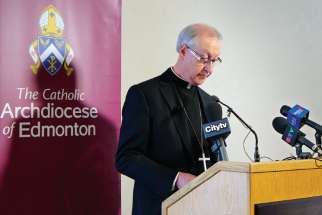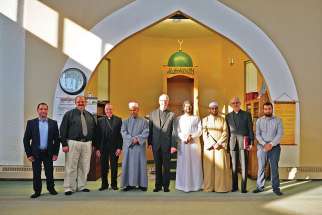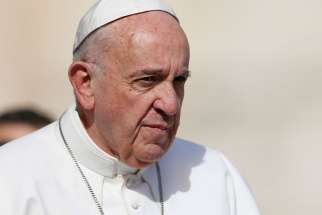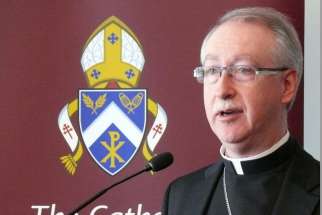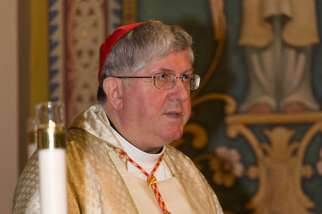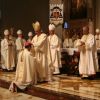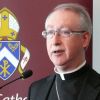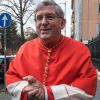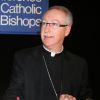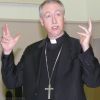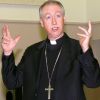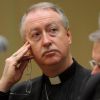EDMONTON – Trust in the Catholic Church has been broken in the wake of horrific reports of clergy sex abuse, but that trust can be restored, said Edmonton Archbishop Richard Smith.
First visit to mosque sets the right tone
EDMONTON - Archbishop Richard Smith formally began his historic visit to Edmonton’s largest and oldest mosque with a traditional Arabic greeting of peace: “As Salaam Alaikum, peace be with you all.”
EDMONTON – Archbishop Richard Smith doesn’t know if Pope Francis is coming to Canada but he is convinced the Pope has been deeply affected by the testimonies of the Truth and Reconciliation Commission.
EDMONTON – The spectre of assisted suicide is leading aging people to "fear an institution that should be the last thing they should ever fear — a hospital," said Edmonton Archbishop Richard Smith.
Canadian bishops join worldwide plea for climate change action
VATICAN CITY - The presidents of the U.S. and Canadian bishops' conferences joined leaders of the regional bishops' conferences of Asia, Africa, Latin America, Oceania and Europe in signing an appeal for government leaders to reach a "fair, legally binding and truly transformational climate agreement" at a summit in Paris.
VATICAN CITY - Pope Francis has formally approved the Canadian delegates to October's world Synod of Bishops on the family.
Miehm ordained as auxiliary bishop for Hamilton
World offers words of hope, joy to Pope Francis
WASHINGTON - Catholic leaders worldwide expressed words of hope and joy in calling upon Catholics to come together as one body behind the papacy of Pope Francis.
VATICAN CITY - Montreal's Cardinal Jean-Claude Turcotte, speaking of newly elected Pope Francis, said he was "always struck by that man, who is a holy man, a man of prayer."
CCCB president thanks Pope Benedict for “extraordinary leadership”
OTTAWA - The president of the Canadian Conference of Catholic Bishops thanked Pope Benedict XVI for his “extraordinary leadership” on the day the world found the pontiff would be stepping down from the papacy.
CCCB president sends letter of condolence on Connecticut shootings
OTTAWA - The Canadian Conference of Catholic Bishops president has sent a condolence letter concerning the Dec. 14 school shootings to his American counterpart.
New D&P president comes on board in trying times
Facing high-profile resignations and protests from within the organization, massive budget cuts and a complete reorganization, the Canadian Catholic Organization for Development and Peace
Bishops ‘silent’ on social justice
A “culture of silence” and deference to “political conservatism” has infected the Canadian Conference of Catholic Bishops (CCCB), charges the head of the Jesuit-founded Centre Justice et Foi (Justice and Faith) in Montreal.
In an open letter to CCCB president Archbishop Richard Smith, Elisabeth Garant said the elimination of the CCCB’s post of senior advisor for social justice, delaying and blunting the Canadian Catholic Organization for Development and Peace’s fall education campaign, inviting Immigration and Citizenship Minister Jason Kenney to a private meeting and not criticizing refugee policy reforms amount to a “serious step back away from the rich Church tradition of social justice.”
Garant’s letter will be on the agenda of the next CCCB executive committee meeting Nov. 27-28. Until then, the conference has chosen to make no comment.
Garant served five years as a member of the CCCB’s Commission on Justice and Peace. She accuses the bishops of cozying up to the Conservative government because, she said, the CCCB has not engaged the Canadian government on an issue of social justice since December 2010. At that time, Kenney dismissed a letter from the bishops’ justice and peace commission as another in “a long tradition of ideological bureaucrats who work for the bishops’ conference producing political letters signed by pastors who may not have specialized knowledge in certain areas of policy.”
“From that moment we observe a silence,” said Garant. “Why are we silent on things that are not our personal issues but that we think for the common good we need to talk about?”
She also questions the CCCB for laying off social justice advisor Francois Poitras in order to help get its finances in order.
CCCB General Secretary Msgr. Patrick Powers has said layoffs were necessary. “We have had to rethink the way we do things, to do more and to cost less,” he told Canadian Catholic News.
“When Msgr. Powers said that this responsibility (for social justice) will be spread among other lay people at the conference, I don’t know any of them who have the experience or the competence to deal with social justice,” she said.
Garant also disputes the CCCB’s explanation behind the delay of the Development and Peace fall campaign. In a joint letter, the CCCB and Development and Peace explained that the campaign was delayed and modified because “concern was expressed that elements of the original materials could be a source of division among bishops, priests, parishioners and donors.”
“They are saying they do that for the sake of some faithful who will be hurt,” said Garant. “There’s no real proof of what they are talking about.”
Garant has yet to receive acknowledgment of her letter from the CCCB or Smith. Smith was in Rome in early November.
Though the Centre Justice et Foi has autonomy, it remains a Jesuit apostolate with the full confidence of Canada’s French-speaking Jesuit fathers, said Garant.
Edmonton twins with northern diocese
EDMONTON - The Edmonton archdiocese and the diocese of Mackenzie-Fort Smith have entered into a twinning arrangement that may lead to more co-operation between the two dioceses.
Edmonton has sent a priest to Mackenzie-Fort Smith and will give half the proceeds from its Nov. 21 Jubilee Gala to this northern diocese to help pay for a new church.
“This is sort of a partnership of mutual support and mutual enrichment,” said Archbishop Richard Smith, who will visit Mackenzie-Fort Smith in March.
In an Oct. 15 interview, the archbishop said this type of twinning arrangement goes back to the 1990s when Blessed John Paul II in his apostolic letter Ecclesia in America encouraged the dioceses of the Western Hemisphere to consider ways that they may enter partnerships with one another of mutual support.
As the question arose about a partnership between Edmonton and another diocese, Smith said his thoughts naturally turned towards South America.
“But as we talked internally about this more and more the question came up what about the needs of our people in the North of Canada?” he said.
The idea of Edmonton, the gateway to the North, twinning with Mackenzie-Fort Smith resonated with local Catholics, he said. Smith said the twinning also recognizes that the Edmonton archdiocese was established through the efforts of missionaries.
“We are the result of a missionary effort and that’s a reminder to us that the Church is and must always be missionary in its outreach.”
Mackenzie-Fort Smith Bishop Murray Chatlain said he is pleased with the twinning. Apart from the sharing of human and material resources, it “will give people (in the Edmonton archdiocese) a chance to understand more who we are, what our life is like and what are some of our blessings and challenges.”
The wheels of the twinning agreement are already in motion. Last June, youth leader Andrew Papenbrock visited Mackenzie-Fort Smith to lead a workshop on youth ministry. Since then, Papenbrock has helped the northern diocese with other youth ministry issues, Chatlain said.
As well, Fr. Arlan Parenteau, an Edmonton priest, was recently sent to serve the northern diocese. “Obviously this is a sacrifice on our part because we certainly need every priest that we can have, but at the same time we have to recognize that the Lord calls us to be generous,” Smith said. Smith said the two dioceses will ask what gifts they can share. When Chatlain spoke in Edmonton at the archdiocese’s Nothing More Beautiful event, Smith recalled, he talked about the great importance that is placed in the North on silence in the encounter with the other.
“That’s something our busy Western culture needs to learn — the value of silence and, within silence, encountering the reality of the other and encountering the reality of God in our midst.”
Chatlain said many people in his diocese travel to Edmonton, especially when facing serious medical issues, and end up attending the city’s parishes. The partnership may enable a deepening of those relationships, he said.
Chatlain said Mackenzie-Fort Smith and Edmonton are also encouraging the twinning of parishes from the dioceses. Funds from the Jubilee Gala, which he will attend, might be used to help renovate the church in Tuktoyaktuk and build a new church in Fort Simpson.
The Mackenzie diocese has 11 priests to cover about 38 communities.
“If we have 10 or 11 healthy priests, I think for the size we are it’s okay,” he said.
“What we are trying to do is to encourage the local leadership.”
Lay people, Chatlain said, lead services, funerals, Baptisms and even perform marriages.
(Western Catholic Reporter)
Canadian Conference of Catholic Bishops plenary to examine updated guidelines on clerical sexual abuse
Ste. ADÈLE, Que. - At their annual plenary Sept. 24-28 the Canadian Conference of Catholic Bishops (CCCB) are examining the prevention of clerical sexual abuse as part of its packed five-day agenda.
The 90-plus bishops gathered from across Canada will receive the updated guidelines prepared for submission to the Congregation for the Doctrine of the Faith, conference president Archbishop Richard Smith said in his annual president’s address at the Mont-Gabriel Hotel here Sept. 23.
“Of course our ongoing response must extend far beyond the articulation of protocols and procedures to an embrace in love and compassion of any person, family or community affected by this scourge,” Smith said.
The reflections will also deal with the impact of the clerical sexual abuse crisis on the ministry of priests and how bishops can provide better support. It will also look at the conditions that increase the risk of sexual abuse with an eye to prevention, according to the CCCB program for the week, most of which is closed to visitors and news media.
“How do we foster healing? How do we ensure safe environments? What are the situations that could facilitate boundary violations?” Smith asked, stressing that those in ministry must provide an “unblemished” example.
For the first time, a federal cabinet minister will address the plenary assembly. The off-the-record discussion with Immigration Minister Jason Kenney arose out of suggestion by previous CCCB president Bishop Pierre Morissette that there be more conversation with government representatives, said Smith, now in his second year of a two-year term as president.
“Over the last few years particularly, a number of you have posed questions about Canadian immigration and refugee policies,” Smith said, noting the bishops “as pastors of the Church are to give particular care for refugees and others displaced because of violence and poverty.”
The relationship between Kenney and the bishops has been contentious in the past, with Kenney firing back at a letter from the CCCB’s justice and peace commission critical of anti-human smuggling legislation the commission feared risked harming refugees more than smugglers. Kenney accused the bishops of relying on bureaucrats who “cut-and-pasted” talking points from immigration advocacy groups.
The session with Kenney will also give bishops an opportunity to talk about the difficulties they have with bringing priests in from foreign countries to serve in their dioceses.
The bishops will also reflect on a pastoral response to the suffering caused by the economic downturn.
“We often hear it said that Canada has not been impacted as seriously as other countries,” Smith said. “While that may be true, nevertheless it is of cold comfort to the unemployed or those struggling to find affordable housing.”
Smith used a theme of unity to organize the many initiatives and programs of the CCCB over the past year, noting the mission of bishops is to serve the Church’s unity.
The CCCB adopted a national plan for life and family that is now underway, that is another sign of unity “in our witness to the beauty and sanctity of life,” he said, noting respect for life continues to erode in Western society.
“Every society needs the assurance its caregivers can be entrusted with the lives of its vulnerable members — those in the womb, children, the elderly, the handicapped and the infirm,” he said. “The grave crimes of abortion, euthanasia and assisted-suicide seriously undermine that trust. These are real threats not only to the individual but also to the common good.”
The bishops are summoned to find ways to “reinforce the central ideals of Christian family life, and to celebrate the love and nurturing that many families today achieve despite difficulties,” he said. Smith said the CCCB would be calling on diocesan life and family offices as well as the Catholic Organization for Life and Family (COLF) for help in this endeavour.
The meetings on the Canadian Catholic Organization for Development and Peace have an hour dedicated to reports by the bishops on the agency's board and from the Standing Committee for Development and Peace.


